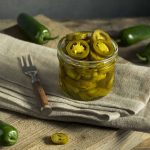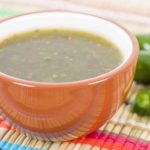Jalapenos are a common ingredient in many sauces, condiments, main courses, and snacks. If you eat them regularly you might wonder: are the seeds safe to eat?
Jalapeno seeds are edible. Contrary to popular belief, they are not the source of the spiciness or heat of the jalapenos, so removing them won’t significantly reduce the heat.
Read on to learn more about the relationship between jalapeno seeds and heat, as well as what happens if you eat them.
Can You Eat Jalapeno Seeds?
The seeds of the jalapeno pepper are edible and are actually not that spicy compared to other chili peppers. The same is true for the seeds in canned, jarred, and smoked jalapeno peppers.
If you buy processed jalapenos, they usually contain seeds. Jalapeno seeds are also often found in pickled jalapenos, jalapeno relish, jalapeno pepper flakes, jalapeno powder, hot sauces, and other spicy flavor products.
Should You Remove Jalapeno Seeds? Does It Reduce Heat?
You can remove jalapeno seeds if you don’t like them, but this won’t affect the overall heat of the peppers.
Unlike other chili pepper seeds, jalapeno seeds only contain a little bit of capsaicin. This means they are not as spicy or hot and their flavor profile is not that profound or robust (source: Food Source Information Colorado Integrated Food Safety Center of Excellence).
The Scoville scale (which is used to measure the heat level of a chili) of a jalapeno is around 2,500–8,000 Scoville heat units, which is considered mild to moderately hot (source: Pepper Scale).
This may sound like a lot, but this figure is nowhere near the hottest known chili peppers in the world, which have Scoville heat units of 1,000,000 to 2,200,000 (hello, Carolina Reaper!).
Therefore, it won’t make much of a difference if you remove the seeds of the jalapenos unless you are very sensitive to spiciness.
A note of caution though. Jalapeno seeds and flesh can burn your fingers and eyes, so make sure you use gloves when handling them and avoid touching the flesh or seeds.
If you want to easily understand how the spiciness of jalapenos compares to other peppers, feel free to explore my resourceful guide that delves into this subject.
What Happens if You Eat Jalapeno Seeds? Is it Bad?
As mentioned above, contrary to what many people believe, it is not the seeds that make the jalapenos spicy. This is because capsaicin is not produced in the seeds.
Rather, capsaicin is made by the capsaicin glands, which are situated between the endocarp (layer surrounding the seeds) and the placenta of the jalapeno pepper (source: Food Source Information Colorado Integrated Food Safety Center of Excellence).
Jalapeno seeds are still spicy, and eating them can cause internal distress and irritation in some people.
Chili peppers, including jalapenos, also contain the substance oleoresin, which is used in pepper spray (source: Journal of the American Optometric Association, Ciência e Técnica Vitivinícola).
Fun fact: the “burn” we get from chili peppers is due to the body reacting to a stimulus. Birds do not have this reaction to jalapenos, which is why they can carry and spread the seeds.
Another reason why jalapenos seeds might cause abdominal discomfort is that spicy foods, in general, cause the intestines to move things faster, which creates gas (source: University of Michigan Health Services).
Jalapenos and their seeds will also cause discomfort, distention, or abdominal pain if you have a peptic ulcer, as well as other functional gastrointestinal disorders.
If you eat jalapenos frequently, you’ll be glad to know there is no evidence that eating a lot of chili peppers can cause long-term injury (source: Bond University).
In short, jalapeno seeds are perfectly safe to eat, although you should probably skip jalapenos altogether if you have underlying gastrointestinal conditions.
Have you ever wondered if it’s safe to eat jalapenos raw? We’ve touched upon that subject too. Check it out if you want to know more about whether jalapenos can be eaten raw and if they are enjoyable!






Comments are closed.